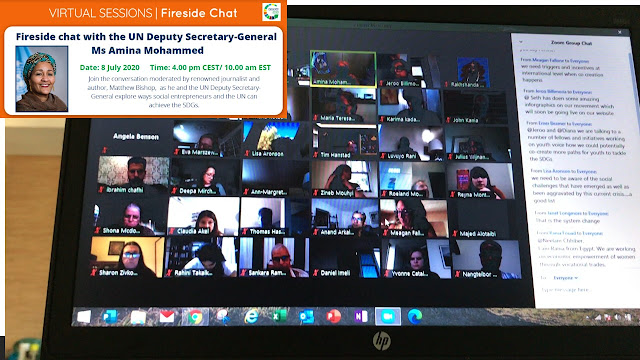Monday, 21 December 2020
Tuesday, 8 December 2020
ARROWSA/INDRA
South to North: Arts for Social change
Climate Change Project
(partially funded by the National Arts Council of South Africa)
1. What was your highlight in the Climate Change Project?
2. What art form was used in that highlight?
3. What action did it result in you taking or wanting to take?
The snippets of interviews were then sent to Vincent who edited them into one video to be found at
The participants' responses revealed the following:
1. It is important to include a range of arts activities for a social change campaign to be effective. The following arts activities made the most impact (all activities were followed by a time of reflection and discussion):
1.1 Storytelling: The use of zoom breakout sessions for participants to create endings for a story that was started by the facilitator and then all the groups presented their unique ending of the story to each other.
1.2 Improvised vocal characterisation: The use of improvisation in a zoom meeting e.g. improvised monologues on what was happening in the participant's area due to COVID-19.
1.3 Movement: The use of abstract movement to music led by a facilitating group in the zoom session. The participants in the hubs respond physically, out of their chairs, even though still in front of their computers e.g. the growth and death of a tree due to human intervention.
1.4 Role play: The use of role play and humour to address serious issues e.g. three participants, play the roles of government ministers who are discussing their portfolios and how they relate to Climate Change. They address the participants from the other hubs in the zoom meeting in their roles as government ministers. OR the facilitator plays the role of a quiz host and the participants from the other hubs are asked questions in a zoom meeting as if on a Climate Change quiz show.
1.5 Power Points: Documentary style power-points including video snippets e.g. the participants of the hub leading the session create an educational project at their school, such as a vegetable garden and recycling, and then take photographs and video snippets which they then share in a zoom session with the other hubs and answer questions stimulated by the power-point.
1.6 Videos: Investigative videos that interview community members e.g. a video, that includes humour and narrated in the first person that centers on interviews of community members of different age groups and their views on Climate Change.
2. The educational aspect of the project was as appreciated as was the art part because the participants were made aware of how little knowledge they had and/or how little they knew about the impact of Climate Change on other parts of the globe.
3. The online interaction was very important to some of the participants during COVID-19 especially during lockdown in order to counteract loneliness.
4. Global youth interaction is important for finding solutions to global issues such as Climate Change.
Thursday, 12 November 2020
Climate Change video
by ARROWSA alumni Vincent Joseph Salanji of Vinnies Vision
The video was made possible with funding by the National Arts Council as part of the
South to North: arts for social change project
that is taking place between ARROWSA, Durban and South Roots International, Cape Flats SA and INDRA UK, Rochdale and Manchester.
In the video, Vincent engages with youth and the elderly from his community in order to find out what they know about Climate Change and what their views on it are. Vincent puts his usual humour into a topic that inspires many different reactions.
Go and have a look!
Monday, 9 November 2020
A collaborative project including ARROWSA, South Roots International, and Indra.
Each of the South African hubs worked on how they could pay it forward. ARROWSA management, friends, and family gave donations towards South Roots’ initiative to help feed children during the lockdown, this continued after the lockdown was eased and is still part of South Roots outreach (see South Roots Instagram page).
Mr. Dlamini
of ARROWSA Bechet voluntarily hosted a workshop with students and Bechet high
school ranging from grade 10-12 on bio-degradable items, the students were
divided into groups so that we were complying with COVID-19 rules and social
distancing.
The learners identified types of bio-degradable items and what we
can use it for. With all their findings they were encouraged to return and share with the
rest of the group. Because of COVID-19
they were unable to host a massive gathering, so the learners recorded their findings,
and these were shared via WhatsApp for everyone to view it. The learners planted
a tree on the school grounds. In the second week, the learners started a vegetable
garden using biodegradable items. At first, some learners were not interested as
they felt the topic was irrelevant to them but the planting of the tree grabbed
their interest as they realized the personal investment that they had in
something that would impact not only them but learners to come. The experiential
learning aspect of the vegetable garden making also grabbed the learners’ interest
as they realized that the vegetables grown would be given to disadvantaged
learners at the school and/or made into soup for disadvantaged learners at the
school.
Mr Bheki Dlamini created a PowerPoint presentation including videos that he shared in a zoom meeting in October 2020 with the South to North participants from ARROWSA Durban, South Roots International Cape Flats, Touchstones Rochdale and Gorsehill Studios, Manchester, United Kingdom. Below you can view the PowerPoint in three parts. Unfortunately, it doesn't include Mr Dlamini's vibrant narration.
Part 1 #climatechange&education
Part 2 #climatechange&education
Part 3 #climatechange&education
South to North: Art for Social Change
ARROW/INDRA
Funding towards implementing this project in Durban and Cape Flats was received from the South Africa National Arts Council
Since July 2020 ARROWSA, South Roots International, Touchstones Rochdale (Indra) and Gorsehill Studios Manchester (Indra) have worked on digital art for social change strategic intervention project initiated by ARROWSA and Indra. Below is a summary of what happened in this project between July and October 2020.
Zoom arts meetings were started informally between the SA and UK hubs in May in order to accelerate the process once the NAC funding was received. From July 2020 to the end of October the hubs met every second Friday except for one Friday break when the youth were on holiday. In between zoom meetings, the hubs met with their youth, engaged with the social topic through the arts, and prepared what they would share the next week. The youth prepared art exercises facilitated by artists for warmups at the start of sessions. These warmup exercises often included engagement with the topic of Climate Change e.g. the SRI tree movement exercise served as a springboard for discussion on human’s impact on nature and how this impacts climate change. The body of the zoom meetings concentrated on the use of the arts for engaging with the social issue of Climate Change.
Different approaches to the use of the arts were engaged e.g. role-play as government ministers in a debate on the topic. The SRI participants decided on characters using the spheres that they are passionate about and they used it to formulate models for how to make our communities aware of the climate change problem and create platforms for them to discover their roles in tackling this matter. They met together as those characters in the zoom session with the other hubs and shared the type of work they are doing and how they have been using their areas of influence to deal with climate change and the health of our people, environment, creation as a whole. Riana of Gorsehill Studios in Manchester (Indra) incorporated role-play as a quiz master engaging with the youth in a quiz show on climate change. All the groups agreed that the quiz enforced how little they knew about climate change. Improvised monologues were also used that engaged with COVID-19 and climate change.
The UK Touchstone group led a session on storytelling. A South Roots International participant shares: "We had a time of creating scenarios and using the imagination to tell stories. It was a great way to get to know each other better. We were placed in different groups that allowed for intercultural connection and were a creative use of zoom".
Visual arts exploration of the representation of climate change and the powers that influence the funding of campaigns for social issues such as climate change. Short music videos made for warmup art exercises to be shared with those who were not present at the session or on social media and public platforms.
The creation of documentary type creative PowerPoints that were presented in sessions and documentary-style short videos on Climate Change that engaged with the community. Short art videos such as the engaging one that Vincent made within his community that engages with the social issue of Climate Change.





















































